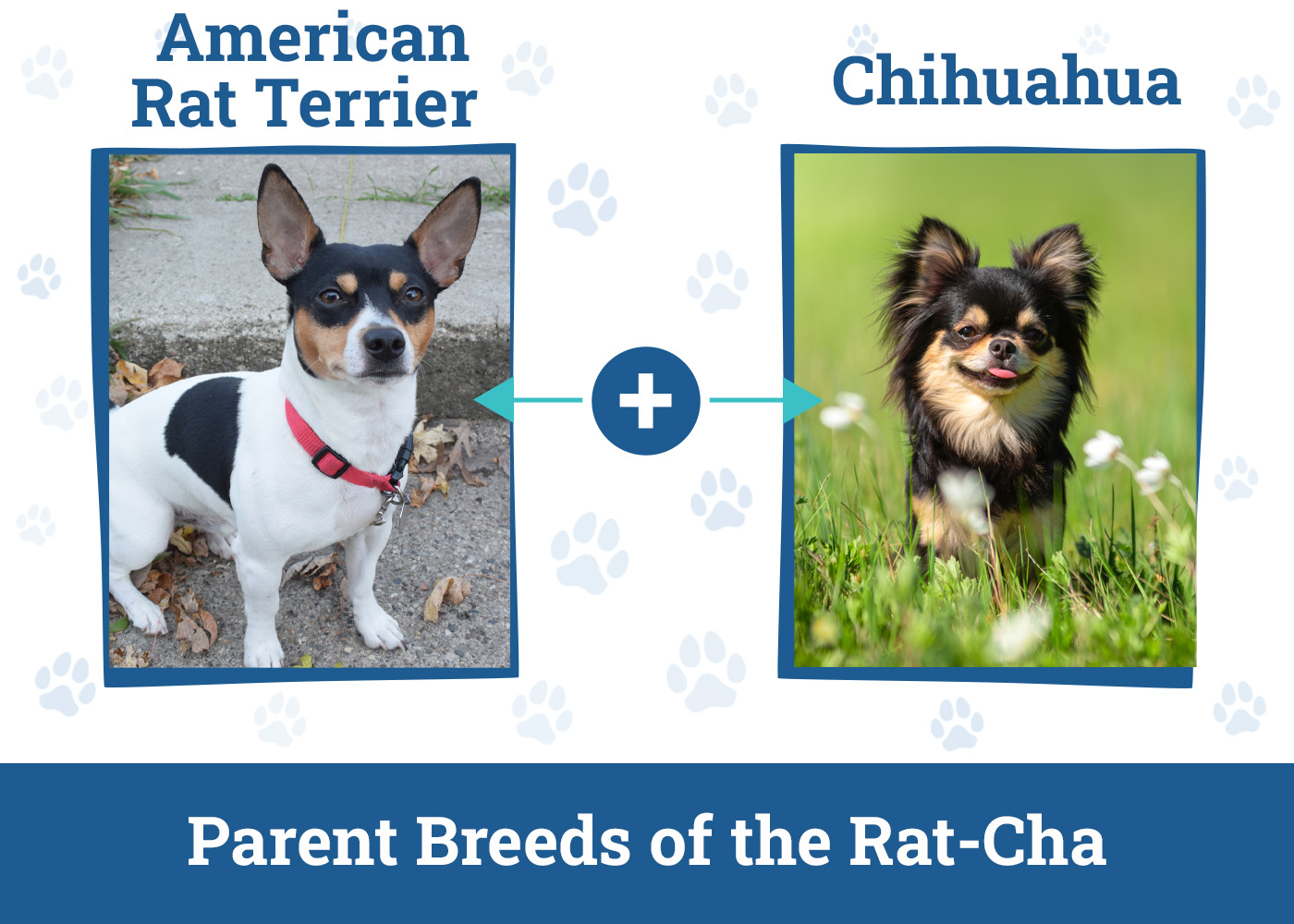In this article
View 8 More +The cute and perky Rat Cha, or American Rat Terrier Chihuahua mix, makes a great low-maintenance family pet that’s lively, loving, and loyal. This little dog is a cross between an American Rat Terrier and a Chihuahua. The Rat Cha is also called the Rat Terrier Chihuahua mix, and it’s a dog that tends to bond with its favorite human companion.
Breed Overview
Height:
12-14 inches
Weight:
11-15 pounds
Lifespan:
13-18 years
Colors:
White, black, brown, sable, red, gray, fawn
Suitable for:
Anyone looking for a small, animated dog that’s fun to play with
Temperament:
Loyal, loving, intelligent, easy to train, friendly
Of course, Rat Chas aren’t for everybody. If you’re thinking of getting one of these dogs, there’s plenty you should know. We’ve put together this complete Rat Cha guide to tell you all about this breed so you can decide if it’s the right dog for you.
Rat Cha Characteristics

Rat Cha Puppies
The Rat Cha is a crossbreed that’s got the Rat Terrier energy level and much of the Chihuahua personality. Small and agile, this little dog will keep you busy with its endless energy levels. A Rat Cha is always willing to play when it’s not spending its time following around its favorite person.
This dog tends to latch on to a single person which is great for a single dog owner but not so great for a family full of dog lovers who are vying for its attention. Rat Chas tend to have very sweet personalities and are incredibly affectionate. They love people of all ages, including small children, as long as they’re willing to play.


Temperament & Intelligence of the Rat Cha
As mentioned above, Rat Chas are smart dogs, and their intelligence is clear to see when you’re working on housetraining or leash walking. This dog aims to please, even though it has a slight stubborn streak. This is a friendly dog that loves to play even if there are no humans or other pets around to play with. Just toss down a few toys and watch this lively and perky little dog have an absolute ball!
Rat Chas can be a bit aggressive toward people and pets they don’t know. This is where the Chihuahua breed shines through. While this dog is not considered dangerous, you should curb any aggressive tendencies you see by correcting the dog using a firm yet gentle voice.
Are These Dogs Good for Families? 🏡
Even though an American Rat Terrier Chihuahua mix will likely choose a single person to follow around and cuddle with, this breed makes a good family pet and will be loving and kind toward everyone in the family, including the youngest kids. Because this is a playful and energetic breed, a Rat Cha will fit right in with an active family that’s always on the go. This little guy is always up for any adventure and loves to have fun and explore the great outdoors.
Does This Breed Get Along with Other Pets? 🐶 😽
A Rat Cha can live in harmony with other pets if they’re introduced slowly and correctly. This dog can be aggressive toward other dogs, especially if another dog tries to get close to the Rat Cha’s favorite human. If you bring a second dog into the family after having a Rat Cha for a while, don’t expect your Rat Cha to become close pals with the new dog, even though it’ll probably accept that it’s living there. Rat Chas are more independent than other breeds and like to do their own thing.

Things to Know When Owning a Rat Cha
With their small size and short hair, Rat Chas are low-maintenance dogs. However, there are still some important things you should know when owning this breed.
Food & Diet Requirements 🦴
The American Rat Terrier Chihuahua mix is a small dog that doesn’t eat a whole lot of food, which probably is a fact that doesn’t surprise you much. What may surprise you is that this dog is not highly interested in food. In fact, a Rat Cha may forget to eat if you don’t remind it.
Even with its “who-cares” attitude about food, a Rat Cha can get fat if you pass out too many dog treats. For this reason, feed your Rat Cha good quality dog food without a lot of calories and fat. Place the food bowl down at the same times each day and pick it up when your Rat Cha is finished eating.
Exercise 🐕
Even though a Rat Cha has lots of energy, this little lounge lizard could easily spend the entire day laying in your lap. That’s why you need to get this dog outside a couple of times a day for a nice long walk or a romp in the yard. When you keep an American Rat Terrier Chihuahua mix well-exercised, it’s less likely to get a case of the zoomies inside during the middle of the night, or at another time in which you don’t appreciate the show of energy.
Keep in mind that a Rat Cha loves to play, and you don’t have to force it to join in on some fun. All it typically takes is to show your dog its favorite dog ball or rope toy and it’ll be good to go.
Training 🎾
A Rat Cha should be trained right away to get along well with all kinds of people and animals. This little dog loves praise, so say it’s a good dog when it behaves calmly and non-aggressively toward other dogs or strangers.
While Rat Chas aren’t known for being fond of learning lots of dog tricks, they certainly can be taught. It’s up to you if you want to teach your Rat Cha to roll over or give you a high five. The most important type of training this dog needs is obedience training. For instance, you should teach your Rat Cha to stay and come on command.
Grooming ✂️
A Rat Cha has a short smooth coat of fur that sheds moderately. Unless you want short dog hair all over your house and clothes, you need to brush a Rat Cha regularly. Use a good quality dog brush and lots of praise when brushing away the loose hairs.
Like other small breeds, Rat Chas are prone to dental issues, and more so when they’re a bit older. Therefore, you should keep this dog’s teeth clean. You can brush your Rat Cha’s teeth with a doggie toothbrush and toothpaste and give it hard and tough treats like bully sticks to help remove tartar and plaque.
Health and Conditions 🏥
While a Rat Cha can live for around 18 long years, this dog breed is still prone to illness.
- Atopy
- Cataracts
- Dental issues
- Glaucoma
- Legg-Calve-Perthes disease
- Progressive retinal atrophy
- Collapsed trachea
- Diabetes
- Hip and elbow dysplasia
- Patellar luxation
Male vs Female
If you think you want a Rat Cha but don’t know whether to get a boy or a girl, there is no big difference between the two as far as temperament goes. Male Rat Chas do tend to be a little bit larger than the females, but the size difference is not a deal-breaker.
If money is a concern, it always costs more to spay a female dog than it does to neuter a male, so maybe consider this factor when deciding between a boy and a girl.

3 Little-Known Facts About the Rat Cha
1. They Can Live a Long Time
It’s not unusual for a Rat Cha to live 18 years or even longer. This means you must be willing to make a long-term commitment when buying a young Rat Cha puppy.
2. They’re the Ultimate Lap Dog
A Rat Cha adores spending lots of time sitting on the lap of its favorite person. When you own a Rat Cha, you can expect it to always want up on your lap, and once there, it won’t want to get down. Maybe it’s the warmth it craves or the closeness, or perhaps both. Whatever the reason, always have your lap available because this is a lap dog through and through!
3. They’re Smart!
While a Rat Cha may not be all that interested in trying to figure out puzzle toys, this little dog is intelligent. It’s relatively easy to housetrain a Rat Cha, as this breed learns new things with ease and catches on quickly to what you want it to do.

Final Thoughts
Rat Chas are small, big-spirited dogs that love to be loved on! This dog is a lap dog through and through! A Rat Cha is also a fun-loving dog that enjoys playing with its human family and even other dogs and animals like cats.
A Rat Cha dog can live happily in an apartment if it is given plenty of opportunities to get outside. Even though the loveable and charming Rat Cha could cuddle with its favorite human all day, this dog, like other breeds, needs some sunshine and exercise. Overall, a Rat Cha is a cute little dog with a likable personality that will fill your home with love!
Featured Image Credit: Anthony George Visuals, Shutterstock






















10 Responses
We gained a Ratcha+ in March when one was abandoned in a chicken wire coop outside of my husband's place of business. She also had a shock collar around her neck (it was probably just for a wireless fence but it was too strong for her. Her skin & hair were gone in a spot. Anyway, I knew she must have some chihuahua and then I guess rat terrier. We had her DNA tested and she's 24% Chihuahua, 22% Rat Terrier, 15% Dachsund, 7% small Poodle, 6% Beagle and then the rest "supermutt". We also age tested her and she is 7. She's 11 lbs. We love her a lot. She's so quiet but is surprisingly adventuresome at times. We learned that the article above is right – she's really not that interested in eating. That's unheard of in our house for human or pet!
Hello Susan,
thank you so much for sharing your story! Your Ratcha+ sounds really cool. It's so great to hear that you saved this poor little doggy's life and gave her a new home. And not being interested in eating that much is another thing that makes your Ratcha so special!
I rescued Pepe 4 years ago he is the most amazing dog I have ever owned…he has to greet everyone on the street and in places he is allowed with such happiness he bring a smile to everyone who meets him…he takes turns with who he wants to snuggle with when at home…people know him by name in the neighborhood…the only problem is he has a long body with short legs and he sometimes scared coming down steps I have to coax him to do it but has no problem running up and he is as fast as a rabbit…a great dog to love rescuing him is one of the best decision my wife and I made….PS my grandkids can't get enough of him LOL.
Hi Joe,
Pepe sounds absolutely delightful! It’s wonderful to hear how much joy he brings to everyone around him, from strangers on the street to your grandkids at home.
Those long bodies and short legs can make stairs a bit tricky, but it’s great that he’s speedy and agile otherwise. Rescuing him clearly gave your family an amazing companion, and it’s heartwarming to see how much love he shares in return.
I love my rat cha. she is adorable and very loving. She was very easy to potty train.
Hello there,
Thank you for your lovely message! It sounds like you have a truly wonderful companion in your Rat-Cha. We're happy to hear she is so adorable, loving, and was easy to potty train.
We wish you and your sweet girl all the best.
My ratcha is very loving but so so stubborn. He thinks he is the boss of me most of the time. Yes he is also very intelligent and will even pout if he doesn't get his way. We are very close(it's just him and me) and was born in my hand 14 years ago. There was a time 10 years ago that he almost died from "valley fever" but with the best vet and medicine he is doing fine. About a year and half ago he was almost devoured by a bull terrier. He had 124 stitches where his tail was almost bitten off. My ratcha is a real trooper. Don't let their size fool you because they are strong and fierce when they have to be. I know mine is and I totally love him.
Hello Cyd,
thank you very much for sharing with us your story about your Rat-Cha! We are very sorry to hear that he got injured, but it is great they managed to survive and heal! We hope you will have many many more great years together!
Best wishes!
This is a great article and right on for our ratcha. I do think an important thing has been left out, their prey drive which is inherited from both sides of the mix. Our little guy has easily caught opossums larger than him, raccoons, squirrels, voles and his favorite, chipmunks. They also have a tendency to dig, but only when in search of prey, ei chipmunk burrows.
Hi Karla, thank you for sharing. It sounds like you have a real hunter on your hands!